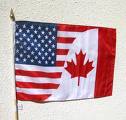Police State Canada: Harper Government Enacts Law Threatening Masked Protesters with Ten-year Jail Terms

Legislation that gives the Canadian state draconian and arbitrary powers to suppress protests became law last week after approval from the Conservative Party-dominated federal parliament.
Bill C-309—the Preventing Persons from Concealing Their Identities during Riots and Unlawful Assemblies Act—makes it a crime punishable by a ten-year prison term to incite a riot while wearing a mask or any face covering, including face paint.
Someone who merely participates in a riot or in an “unlawful” assembly with their face covered can, under the new law, be deemed to have committed an indictable criminal offense and jailed for up to five years.
These new offenses are in addition to the existing Criminal Code offenses of participating in a riot and participating in an unlawful assembly. Persons convicted of the former can be jailed for a maximum of two years, while the latter is considered to be among the lowest tier of criminal offenses known as “summary offenses,” which carry a maximum six-month jail term.
Under Canadian law, police and other authorities have very broad powers to illegalize protests by declaring them “unlawful assemblies.” The Criminal Code describes an “unlawful assembly” as a gathering that causes people “to fear on reasonable grounds” that it “will disturb the peace tumultuously” or provoke others to do so.
During last year’s six month-long Quebec student strike, police declared numerous protests “unlawful assemblies,” then violently set about dispersing the crowd with tear gas, baton-charges and mass arrests. In response to the tear gas, many demonstrators covered their faces with handkerchiefs. Had the new law been in force, they could potentially have been charged with concealing their identities and targeted for punitive jail terms of up to five years.
Critics of the new law have rightly condemned it as a flagrant attack on the right to free speech. Masks and face paint have been used for centuries to make political points, and there are many reasons, including fear of victimization by employers, that can cause protesters to choose to conceal their faces. Police, it need be added, have subjected political protests to blanket surveillance for years, systematically photographing and videotaping demonstrators.
Moreover, there is a long history of police instigating violence at demonstrations—through provocative crowd-control tactics and the use of agent provocateurs—so as to justify their suppression. In 2007, undercover Quebec Provincial Police officers were caught trying to incite people protesting at a trilateral US-Canada-Mexico heads of government meeting in Montebello, Quebec to attack the police. (See: “Canada: Police agent-provocateurs unmasked at Montebello summit protests”)
Bill C-309 began as a private member’s bill. Only rarely do such bills become law, but the Conservative government chose to make it a legislative priority. As the result of an amendment proposed by Robert Goguen, the parliamentary secretary to Justice Minister Rob Nicholson, and passed by the Conservative-dominated Justice Committee, the maximum penalty for the crime of inciting a riot while wearing some form of face-covering was increased from five to ten years.
In arguing for the legislation, the Conservatives said they wanted to give police an “additional tool” to deal with rioters.
In fact the most serious violence at political protests, to say nothing of the gravest attacks on democratic riots, have been committed by Canadian authorities. During the 2010 G-20 summit in Toronto—in a wholesale suppression of democratic rights that was abetted and supported by all three levels of government—police kicked, bludgeoned, tear-gassed, and shot rubber bullets at protesters, as well as numerous passersby. Journalists covering these unprecedented events were themselves arrested and assaulted.
In what the Ontario Ombudsman called the “most massive compromise of civil liberties in Canadian history,” 1,100 people were arrested. Those apprehended in this dragnet were hauled into primitive detention cages, strip-searched and denied legal counsel. Subsequently, charges were dropped against the vast majority, with only a small fraction ever convicted of anything.
In Canada, as around the world, a ruling elite whose wealth and incomes have soared as a result of the a class war offensive on job, wages, and public services, has responded to growing opposition by moving to criminalize dissent.
In the past two years, the Conservative government has repeatedly illegalized strikes and impending strikes by Canada Post, Air Canada and CP Rail workers. Now Quebec’s Parti Quebecois government is threatening to criminalize a week-old strike of 175,000 construction workers.
In May 2012, the then Quebec Liberal government adopted an emergency law that effectively outlawed the Quebec student strike and placed sweeping restrictions on the right to strike over any issue in the province. On taking office the following September, the PQ made a show of repealing Bill 78, but it has endorsed repressive bylaws adopted during the student strike by Montreal, Quebec City, and many other Quebec municipalities. These bylaws make it illegal to demonstrate without the police’s express authorization of the protest route. In many cases, they also make it illegal to wear a mask, face covering or face paint at a protest even if the protest is legal. Police have already used the presence of masked demonstrators at protests to declare them “unlawful assemblies,” making all those participating liable to arrest and fines.
As a result of the new federal law, Montreal Police could potentially invoke the municipal bylaw against face-covered protestors so as to declare a protest illegal, then charge those who are face-covered with participating in an unlawful assembly while concealing their identities, making them liable to punitive jail terms
The criminalization of dissent goes hand in hand with the build-up of a secret state-within-the state. Under a series of ministerial directives, whose existence let alone content has been kept unknown to Canadians, Liberal and Conservative governments have authorized the Communications Security Establishment Canada (CSEC)—a close partner of the U.S. National Security Agency—to mine the metadata of Canadians’ telephone, computer, and other electronic communications since at least 2005.

